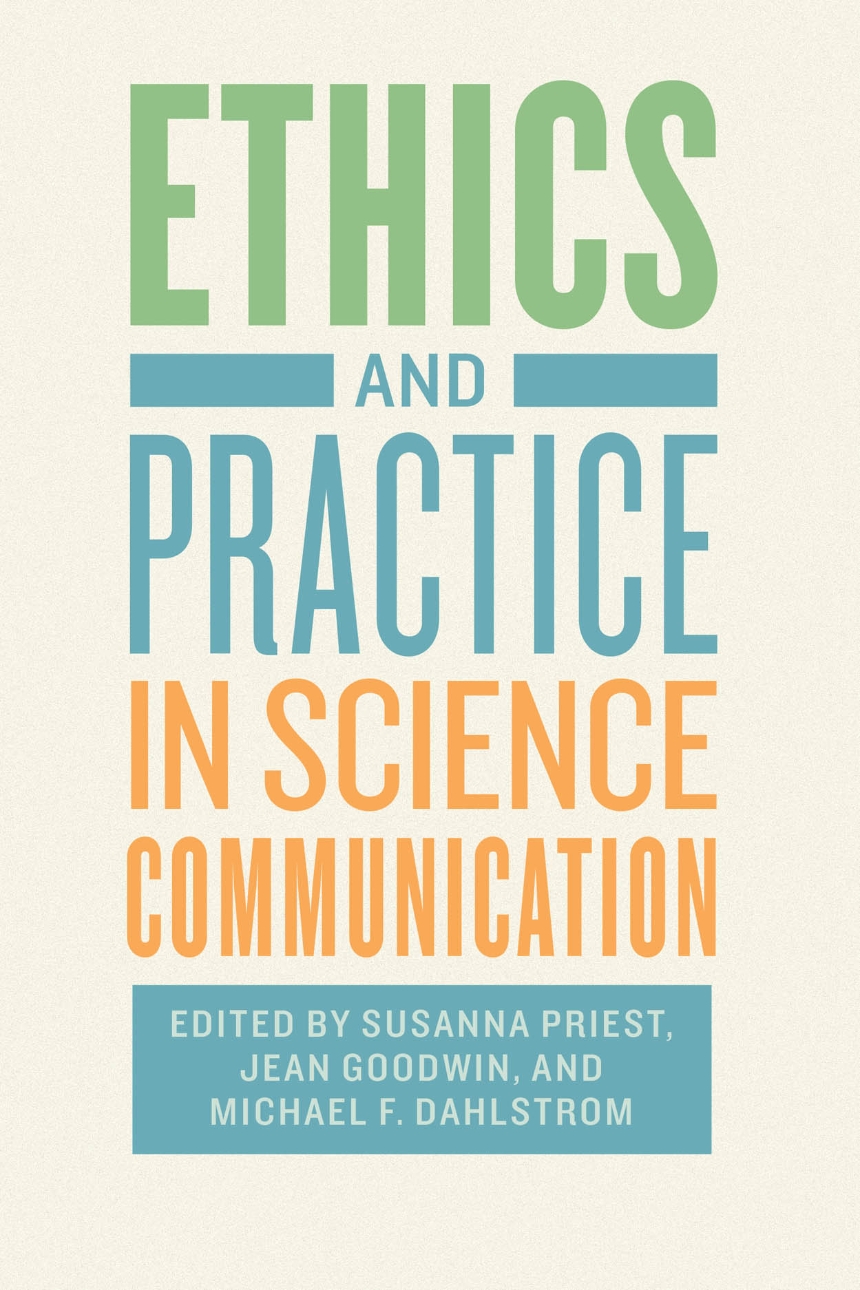Ethics and Practice in Science Communication
From climate to vaccination, stem-cell research to evolution, scientific work is often the subject of public controversies in which scientists and science communicators find themselves enmeshed. Especially with such hot-button topics, science communication plays vital roles. Gathering together the work of a multidisciplinary, international collection of scholars, the editors of Ethics and Practice in Science Communication present an enlightening dialogue involving these communities, one that articulates the often differing objectives and ethical responsibilities communicators face in bringing a range of scientific knowledge to the wider world.
In three sections—how ethics matters, professional practice, and case studies—contributors to this volume explore the many complex questions surrounding the communication of scientific results to nonscientists. Has the science been shared clearly and accurately? Have questions of risk, uncertainty, and appropriate representation been adequately addressed? And, most fundamentally, what is the purpose of communicating science to the public: Is it to inform and empower? Or to persuade—to influence behavior and policy? By inspiring scientists and science communicators alike to think more deeply about their work, this book reaffirms that the integrity of the communication of science is vital to a healthy relationship between science and society today.
In three sections—how ethics matters, professional practice, and case studies—contributors to this volume explore the many complex questions surrounding the communication of scientific results to nonscientists. Has the science been shared clearly and accurately? Have questions of risk, uncertainty, and appropriate representation been adequately addressed? And, most fundamentally, what is the purpose of communicating science to the public: Is it to inform and empower? Or to persuade—to influence behavior and policy? By inspiring scientists and science communicators alike to think more deeply about their work, this book reaffirms that the integrity of the communication of science is vital to a healthy relationship between science and society today.
336 pages | 3 tables | 6 x 9 | © 2018
Philosophy: Ethics
Sociology: Theory and Sociology of Knowledge
Reviews
Table of Contents
Foreword
Rush Holt and Jeanne Braha
Introduction to this Book
Susanna Priest, Jean Goodwin, and Michael F. Dahlstrom
Part 1: How Ethics Matters
1: Effective because Ethical: Speech Act Theory as a Framework for Scientists’ Communication
Jean Goodwin
2: Communicating Science-Based Information about Risk: How Ethics Can Help
Paul B. Thompson
3: Communicating Climate Change and Other Evidence-Based Controversies: Challenges to Ethics in Practice
Susanna Priest
4: Framing Science for Democratic Engagement
Leah Sprain
Part 2: Professional Practice
5: Ethical Considerations of Using Narrative to Communicate in Science Policy Contexts
Michael F. Dahlstrom and Shirley S. Ho
6: Science Communication as Communication about Persons
Brent Ranalli
7: Journalists, Expert Sources, and Ethical Issues in Science Communication
Marjorie Kruvand
8: The Ethics and Boundaries of Industry Environmental Campaigns
Barbara Miller Gaither and Janas Sinclair
9: Scientists’ Duty to Communicate: Exploring Ethics, Public Communication, and Scientific Practice
Sarah Davies
Part 3: Case Studies
10: Just the Facts or Expert Opinion? The Backtracking Approach to Socially Responsible Science Communication
Daniel J. McKaughan and Kevin C. Elliott
11: Controversy, Commonplaces, and Ethical Science Communication: The Case of Consumer Genetic Testing
Lora Arduser
12: Excluding “Anti-biotech” Activists from Canadian Agri-Food Policy Making: Ethical Implications of the Deficit Model of Science Communication
Kelly Bronson
13: Science Communication Ethics: A Reflexive View
Alain Létourneau
14: How Discourse Illuminates the Ruptures between Scientific and Cultural Rationalities
Cynthia-Lou Coleman
Afterword
Susanna Priest, Jean Goodwin, and Michael F. Dahlstrom
List of Contributors
Index
Rush Holt and Jeanne Braha
Introduction to this Book
Susanna Priest, Jean Goodwin, and Michael F. Dahlstrom
Part 1: How Ethics Matters
1: Effective because Ethical: Speech Act Theory as a Framework for Scientists’ Communication
Jean Goodwin
2: Communicating Science-Based Information about Risk: How Ethics Can Help
Paul B. Thompson
3: Communicating Climate Change and Other Evidence-Based Controversies: Challenges to Ethics in Practice
Susanna Priest
4: Framing Science for Democratic Engagement
Leah Sprain
Part 2: Professional Practice
5: Ethical Considerations of Using Narrative to Communicate in Science Policy Contexts
Michael F. Dahlstrom and Shirley S. Ho
6: Science Communication as Communication about Persons
Brent Ranalli
7: Journalists, Expert Sources, and Ethical Issues in Science Communication
Marjorie Kruvand
8: The Ethics and Boundaries of Industry Environmental Campaigns
Barbara Miller Gaither and Janas Sinclair
9: Scientists’ Duty to Communicate: Exploring Ethics, Public Communication, and Scientific Practice
Sarah Davies
Part 3: Case Studies
10: Just the Facts or Expert Opinion? The Backtracking Approach to Socially Responsible Science Communication
Daniel J. McKaughan and Kevin C. Elliott
11: Controversy, Commonplaces, and Ethical Science Communication: The Case of Consumer Genetic Testing
Lora Arduser
12: Excluding “Anti-biotech” Activists from Canadian Agri-Food Policy Making: Ethical Implications of the Deficit Model of Science Communication
Kelly Bronson
13: Science Communication Ethics: A Reflexive View
Alain Létourneau
14: How Discourse Illuminates the Ruptures between Scientific and Cultural Rationalities
Cynthia-Lou Coleman
Afterword
Susanna Priest, Jean Goodwin, and Michael F. Dahlstrom
List of Contributors
Index
Awards
Choice Magazine: CHOICE Outstanding Academic Title Awards
Won
Communication Ethics Division, National Communication Association: Edited Book of the Year
Won
